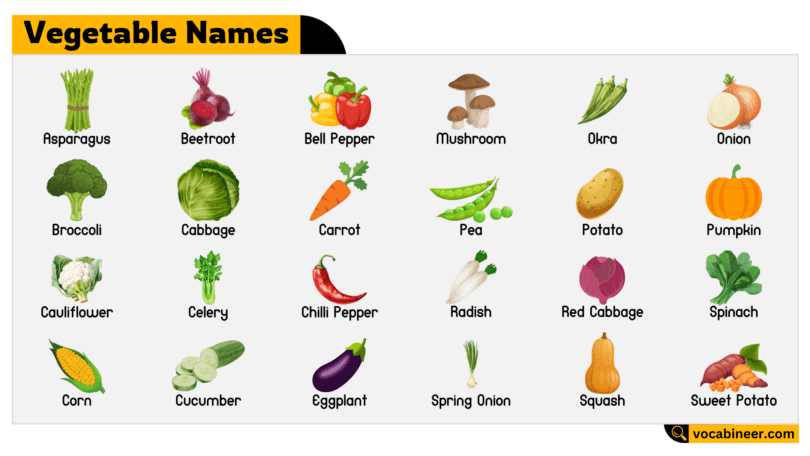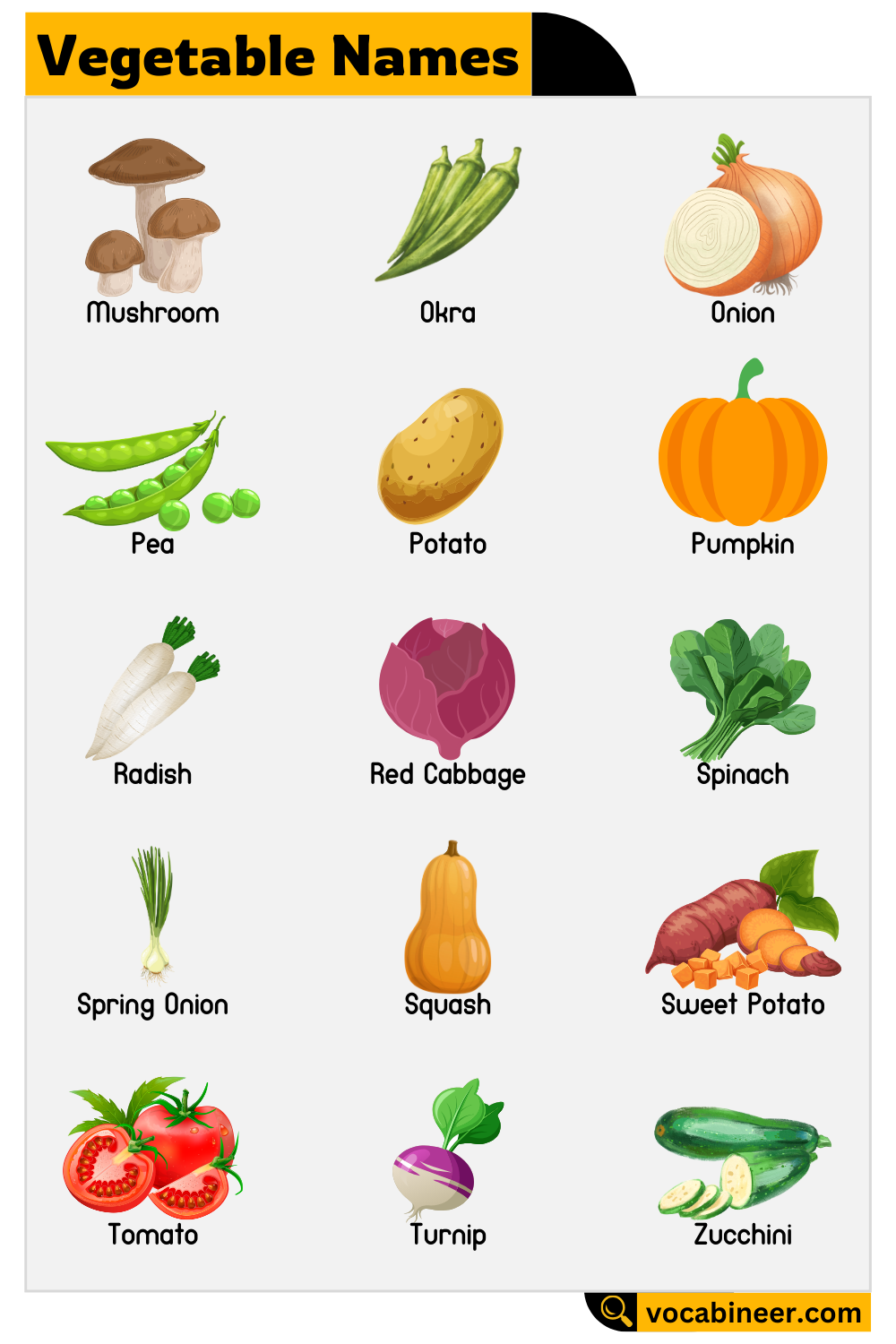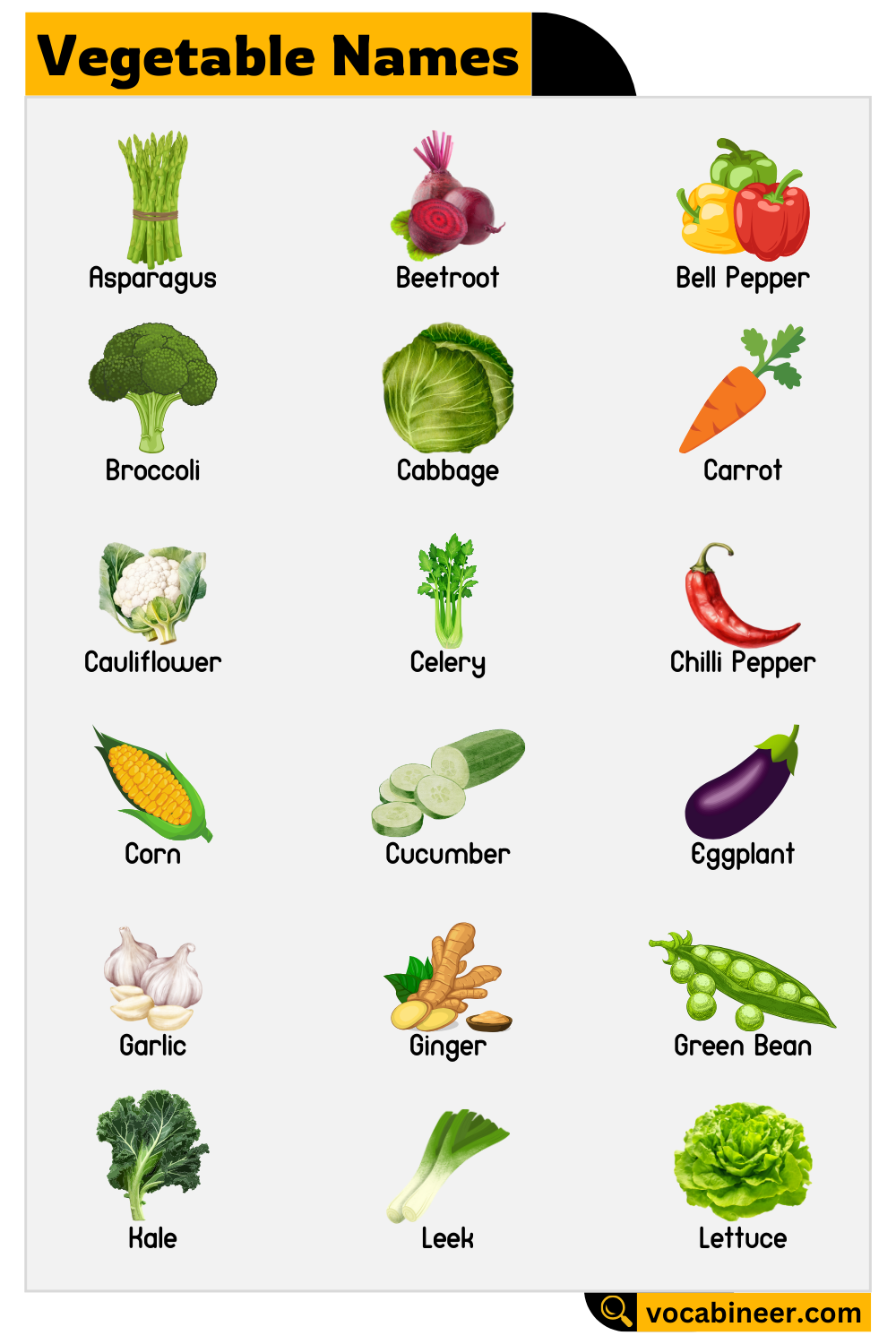Learning vegetable names can significantly boost your English vocabulary, especially if you’re a beginner or intermediate learner. Knowing these terms is useful in daily life, particularly in markets, kitchens, and conversations about food and nutrition. Pictures help learners easily memorize vocabulary, overcoming common challenges faced when learning new words. Want to expand your knowledge further? Visit our Picture Vocabulary category for more engaging visual vocabulary lessons.
In This Page
Vegetable Names in English
Understanding vegetable names in English helps you communicate better and shop confidently. Let’s learn different types clearly categorized with memorable traits or fun facts.
Root Vegetables Names
Root vegetables grow underground and are usually nutritious and filling.
- Beetroot: Deep red, known for improving blood flow and heart health.
- Carrot: Crunchy, orange vegetable beneficial for eyesight.
- Potato: Versatile staple, great source of energy-rich carbohydrates.
- Sweet Potato: Sweet, nutritious root high in vitamins and fiber.
- Turnip: White or purple root with a slightly peppery taste.
- Radish: Crisp, spicy vegetable typically eaten raw in salads.
Leafy Green Vegetables
Leafy greens are known for their health benefits and freshness.
- Spinach: Rich in iron and commonly used fresh or cooked.
- Kale: Dense leafy green packed with vitamins and antioxidants.
- Lettuce: Mild-tasting leaf commonly used in salads and sandwiches.
- Cabbage: Versatile leafy vegetable used in various dishes worldwide.
- Red Cabbage: Purple-colored cabbage with antioxidant properties.
Fruiting Vegetables Names
These vegetables have seeds and develop from the flower.
- Tomato: Juicy red fruit widely used as a vegetable.
- Bell Pepper: Sweet pepper available in various colors.
- Eggplant: Purple-skinned vegetable often used in savory dishes.
- Cucumber: Refreshing vegetable usually eaten fresh in salads.
- Pumpkin: Large vegetable typically used in soups or desserts.
- Zucchini: Mild-flavored vegetable used cooked or raw in dishes.
- Squash: Soft-fleshed vegetable with a sweet flavor.
- Okra: Slimy-textured vegetable popular in stews and curries.
Cruciferous Vegetables
Cruciferous vegetables are known for their health-boosting nutrients.
- Broccoli: Green vegetable rich in vitamins and cancer-fighting nutrients.
- Cauliflower: White, versatile vegetable that can replace grains.
Aromatic Vegetables
These vegetables enhance flavors in cooking.
- Garlic: Small cloves used for their strong, pungent flavor.
- Onion: Common cooking ingredient known for adding flavor.
- Leek: Mild-flavored relative of onions, great in soups.
- Spring Onion: Mild onion used as a garnish or in cooking.
- Ginger: Spicy root often used fresh or powdered.
Legumes and Pods
Vegetables with edible seeds or pods.
- Green Bean: Slim pods eaten fresh or cooked.
- Pea: Small, round green vegetables eaten fresh or cooked.
Other Vegetables
- Corn: Sweet, yellow kernels enjoyed boiled, grilled, or popped.
- Asparagus: Nutritious green spears often grilled or steamed.
- Celery: Crunchy stalks usually eaten raw or in soups.
- Chilli Pepper: Spicy vegetable widely used to add heat to dishes.
- Mushroom: Fungi used for their earthy flavor and texture.
Download Your Free High-Quality Vegetable Names Infographic!
Enhance your English vocabulary skills quickly with our beautifully designed, printable infographic. Perfect for practicing vegetable names visually and effectively. Download your PDF now!








